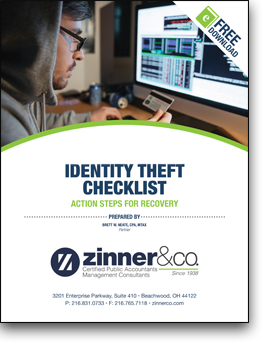IRS Warns of New Phone Scam Involving Bogus Certified Letters; Reminds People to Remain Vigilant Against Scams, Schemes this Summer
Zinner & Co. Tax Team fraud , income tax , IRSPartner Howard J. Kass, CPA, CGMA, AEP®, was recently installed as president of the Cleveland-Akron Chapter of the Society of Finance Service Professionals.
"It is an honor and privilege to serve the Society and continue its longstanding mission of setting and promoting standards of excellence for professionals in financial services.
Employers: $1 billion Headed Your Way in July
Zinner & Co. Bureau of Worker's Compensation , Taxes - Corporate & Business , Business - Management, Issues & ConcernsFrom the Ohio Bureau of Workers' Compensation news desk
June 15, 2017
Ohio’s economy will get a big boost in July. That’s when the BWC will send $1 billion in rebates to eligible Ohio employers, the first part of The Third Billion Back plan that was announced in March.
IRS Alerts Taxpayers with Limited English Proficiency of Ongoing Phone Scams; Urges Caution Before Paying Unexpected Tax Bills
Brett W. Neate, CPA, MTax Brett W. Neate , Credit card fraud , IRSCon artists often approach victims in their native language, threaten them with deportation, police arrest and license revocation, among other things.
“These scammers continue to adapt and evolve, and the IRS continues to receive reports of these schemes using multiple languages trying to find victims across the country,” IRS Commissioner John Koskinen said.
Q: I am fed up and frustrated trying to keep—and remember passwords that are both complex and creative. This is frustrating and I am at my wit's end. What can I do to make it easier for me to remember but more secure against attacks? -Mary Kay C, Business Executive, Brookpark, Ohio
A: Thanks for your question, Mary Kay. Yours is one that almost everyone can relate and you are not alone in your frustration. Fortunately, I may be able to provide some insight and an alternative for you.
Common Cents: Can you deduct summer travel with business expenses?
Zinner & Co. Tax Department business travel expenseDeductibility of local travel If you are self-employed and your residence is your principal place of business, you can deduct expenses you incur in traveling from your residence to any other work location.
Why Your 401(K) Plan May Not Be the “End-All Be-All” For Your Retirement
Zinner & Co. Tax Department Brett W. Neate , Taxes - Planning, Rules and Returns , Retirement Planning & IRAsSince their inception via the Revenue Act of 1978, 401(k) plans have been great tools to help workers save for retirement. While a 401(k) plan has many advantages, there are also some drawbacks to them that one should consider when creating a comprehensive retirement-strategy.
The advantages of a 401(k)
The basic concept of a 401(k) plan is to allow workers to make pre-tax contributions to the plan from their paychecks. As a result, money contributed is not included in their taxable income for that year.
Show Me the Money - How InvestOhio may reduce your taxes
Brett W. Neate, CPA, MTax Ohio business owners , Brett W. Neate , Taxes - Corporate & BusinessWhile there are a myriad of ways to reduce Ohio income taxes that are well known and widely leveraged, some methods seem to go largely unnoticed. One of those lesser-known and underutilized methods that every small business owner, or those interested in owning a small business, should be aware of is the InvestOhio program.
InvestOhio, launched by the State of Ohio several years ago, was created to encourage investment in Ohio-based eligible small businesses. Qualifying applicants to this program will receive non-refundable Ohio personal income tax credits equal to 10% of their investment in an eligible small business. Any unused credits can be carried forward up to seven years.
When Sallie Mae is on Your Personal Payroll
DeAnna Alger, CPA DeAnna Alger , Financial Planning - CollegeNow that income tax filing season is behind us, it is not too early to plan and prepare for 2018. For many taxpayers, the idea of an income tax refund of any amount is welcome, anticipated, and often needed.
Few people think that they have “too much” money, and as taxpayers continue to receive their IRS income tax refund, folks begin to consider paying off credit cards or making a large purchase. Sadly, however, when Sallie Mae is on one’s personal payroll, that shopping spree or big screen TV may be just a virtual reality. Sallie Mae is the nation's saving, planning, and paying for college company. Their mission is to help American students and families make the dream of higher education a reality through borrowing.
According to a recent article in Time Magazine, about 8 million (education loan) borrowers have given up paying on more than $137 billion in education debts.
What does this mean? If a taxpayer has defaulted on their federal student loans, their refund may not be issued and instead, applied to what is called a tax refund offset.
Oops. What you need to know if you discover an error after you have filed your income tax return.
Zinner & Co. Tax Department Taxes - Individual , IRS , Matt SzydlowskiIf you discover an error after filing your return, you may need to amend your return. The IRS may correct mathematical or clerical errors on a return and may accept returns without certain required forms or schedules.
In these instances, there's no need to amend your return. However, do file an amended return if there's a change in your filing status, income, deductions, or credits. Use Form 1040X (PDF), Amended U.S. Individual Income Tax Return, to correct a previously filed Form 1040 (PDF), Form 1040A (PDF), Form 1040EZ (PDF), Form 1040NR (PDF), Form 1040NR-EZ (PDF), or to change amounts previously adjusted by the IRS.
You can also use Form 1040X to make a claim for a carryback due to a loss or unused credit; however, you may also be able to use Form 1045 (PDF), Application for Tentative Refund, instead of Form 1040X. Also, if the Form 8938 (PDF), Statement of Specified Foreign Financial Assets, applies to you, file it with an annual return or an amended return. See the Form 8938 Instructions for more information.
Learn more about income tax planning from the Zinner & Co. tax team
About Us

Since 1938, Zinner has counseled individuals and businesses from start-up to succession. At Zinner, we strive to ensure we understand your business and recognize threats that could impact your financial situation.
Recent Blog Posts
Categories
- 1031 Exchange (2)
- 401k (2)
- 529 plan (4)
- ABLE Act (1)
- account systems (3)
- accounting (8)
- Affordable Care Act (8)
- alimony (2)
- American Rescue Plan Act (1)
- Ask the Expert (5)
- Audit and Assurance Department (13)
- audits (8)
- Bank Secrecy Act (1)
- banks (1)
- Barbara Theofilos (6)
- Beneficial Ownership Information (1)
- Bitcoin (1)
- block chain (2)
- BOI (3)
- Bookkeeping (1)
- Brett W. Neate (28)
- budgets (1)
- Bureau of Worker's Compensation (12)
- Business - Management, Issues & Concerns (50)
- business income deduction (3)
- business succession (7)
- business travel expense (3)
- business valuation (5)
- capital gains (2)
- careers (7)
- cash flow (2)
- Child Tax Credit (2)
- Chris Valponi (8)
- City of Cleveland (1)
- Cleveland COVID-19 Rapid Response Fund (1)
- Cleveland Rape Crisis Center (2)
- college (3)
- Community (24)
- Compliance (1)
- Coronavirus (24)
- Corporate Transparency Act (1)
- COVID-19 (30)
- Credit card fraud (5)
- credit reporting (2)
- cryptocurrency (2)
- CTA (2)
- cybersecurity (16)
- dead (1)
- DeAnna Alger (6)
- death (2)
- debt (4)
- deductions (14)
- Deferring Tax Payments (4)
- Department of Job and Family Services (2)
- depreciation (1)
- Digital Tax Payment (1)
- divorce (4)
- DOMA (3)
- Economic Impact Payments (2)
- Economic Injury Disaster Loan (4)
- education (8)
- EIDL (1)
- electronic filing (4)
- Electronic Tax Payments (2)
- Emergency Working Capital Program (1)
- employee benefit plan auditor (1)
- Employee Leave (2)
- Employee or Independent Contractor (6)
- Employee Retention Credit (3)
- employment (2)
- ERC (3)
- Eric James (8)
- Estates, Gifts & Trusts (48)
- expenses (5)
- Families First Coronavirus Response Act (2)
- FASB (1)
- FBAR (1)
- FDIC coverage (1)
- Federal Assistance (4)
- filing (3)
- financial planning (8)
- Financial Planning - College (9)
- financing (3)
- Firm news (119)
- first responders (1)
- FMLA (1)
- foreign assets (3)
- fraud (38)
- FSA (1)
- fundraising (9)
- Gabe Adler (1)
- gift tax (5)
- HDHP (2)
- health care (3)
- home (2)
- home office (1)
- Howard Kass (2)
- HRA (1)
- HSA (5)
- identity theft (32)
- income (1)
- income tax (57)
- independent contractor (1)
- Inflation (1)
- Insurance (7)
- internal control (4)
- international (2)
- Intuit (1)
- investments (4)
- IRS (88)
- jobs (5)
- John Husted (1)
- K-1 (1)
- Laura Haines (3)
- Layoff (2)
- Layoffs (1)
- leadership (3)
- lease accounting standards (1)
- life insurance (1)
- LLC (3)
- Loans (2)
- longevity income annuities (1)
- Lorenzo's Dog Training (1)
- Magic of Lights (1)
- management advisory (3)
- manufacturing (2)
- Matt Szydlowski (3)
- medical (7)
- Medicare (2)
- mergers and acquisitions (1)
- Mike DeWine (2)
- Millennial Concepts (2)
- minimum wage (1)
- NAIOP (1)
- National Defense Act (1)
- non-profit reporting (10)
- non-profits (38)
- not-for-profit (26)
- ODJFS (1)
- office (1)
- ohio (13)
- Ohio business owners (18)
- Ohio Department of Jobs and Family Services (3)
- Ohio Department of Taxation (3)
- Ohio Incumbent Workforce Training Voucher Program (1)
- Online Tax Payment (3)
- Operations (2)
- OPERS (1)
- owners of foreign entities (1)
- partnerships (5)
- passwords (1)
- Paycheck Protection Program (9)
- payroll (8)
- penalties (3)
- pension (2)
- personal finance (2)
- planning (4)
- ppp (7)
- Productivity (5)
- Qualified Business Income (1)
- quickbooks (10)
- real estate (14)
- record retention (2)
- records (2)
- Reporting (1)
- Republican National Convention (1)
- Retirement Planning & IRAs (53)
- Richard Huszai, CPA (5)
- RITA (1)
- Robin Baum (6)
- RRF (1)
- S Corporation (1)
- SALT (8)
- SBA (8)
- scams (12)
- SECURE 2.0 Act (1)
- security (6)
- SharedWorks (1)
- Shutdown (3)
- Silver Linings (9)
- simplified employee pension (1)
- Small Business (5)
- SMB (12)
- Social Media (1)
- social security (4)
- Speaker Series (2)
- spouse (1)
- start ups (8)
- Stay at Home Order (3)
- Steven Mnuchin (1)
- Sue Krantz (6)
- SVOG (1)
- tangible property (1)
- tax (27)
- tax avoidance (12)
- Tax Credit (7)
- Tax Cuts and Jobs Act of 2017 (31)
- Tax Exempt (1)
- Tax Holiday (1)
- Tax Interns (2)
- tax services (28)
- taxes (45)
- Taxes - Corporate & Business (104)
- Taxes - Individual (117)
- Taxes - Planning, Rules and Returns (188)
- TechCred (1)
- technology (7)
- The CARES Act (6)
- The SOURCE (1)
- tiag (3)
- transaction advisory (2)
- Treasury Department (5)
- tuition (3)
- U.S. Department of the Treasury (1)
- U.S. Small Business Administration (6)
- Unclaimed Funds (1)
- Unemployment Benefits (4)
- withdrawls (2)
- withholding (6)
- Workers Comp Billing Changes (1)
- Zinner & Co. (32)
- Zinner News (30)












